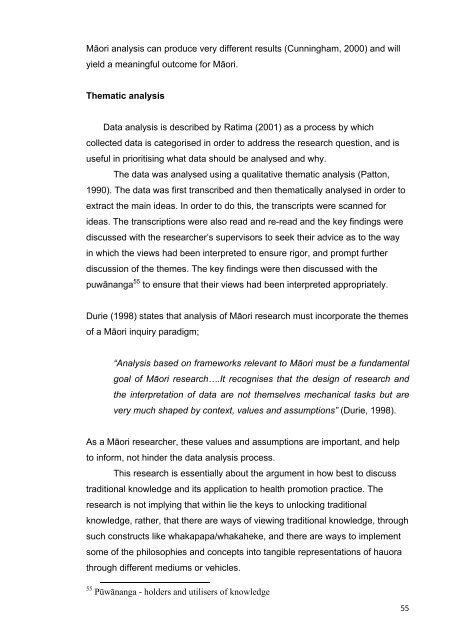Te Māoritanga WELLBEING AND IDENTITY Kapa Haka as a Vehicle
Te Māoritanga WELLBEING AND IDENTITY Kapa Haka as a Vehicle
Te Māoritanga WELLBEING AND IDENTITY Kapa Haka as a Vehicle
Create successful ePaper yourself
Turn your PDF publications into a flip-book with our unique Google optimized e-Paper software.
Māori analysis can produce very different results (Cunningham, 2000) and will<br />
yield a meaningful outcome for Māori.<br />
Thematic analysis<br />
Data analysis is described by Ratima (2001) <strong>as</strong> a process by which<br />
collected data is categorised in order to address the research question, and is<br />
useful in prioritising what data should be analysed and why.<br />
The data w<strong>as</strong> analysed using a qualitative thematic analysis (Patton,<br />
1990). The data w<strong>as</strong> first transcribed and then thematically analysed in order to<br />
extract the main ide<strong>as</strong>. In order to do this, the transcripts were scanned for<br />
ide<strong>as</strong>. The transcriptions were also read and re-read and the key findings were<br />
discussed with the researcher’s supervisors to seek their advice <strong>as</strong> to the way<br />
in which the views had been interpreted to ensure rigor, and prompt further<br />
discussion of the themes. The key findings were then discussed with the<br />
puwānanga 55 to ensure that their views had been interpreted appropriately.<br />
Durie (1998) states that analysis of Māori research must incorporate the themes<br />
of a Māori inquiry paradigm;<br />
“Analysis b<strong>as</strong>ed on frameworks relevant to Māori must be a fundamental<br />
goal of Māori research….It recognises that the design of research and<br />
the interpretation of data are not themselves mechanical t<strong>as</strong>ks but are<br />
very much shaped by context, values and <strong>as</strong>sumptions” (Durie, 1998).<br />
As a Māori researcher, these values and <strong>as</strong>sumptions are important, and help<br />
to inform, not hinder the data analysis process.<br />
This research is essentially about the argument in how best to discuss<br />
traditional knowledge and its application to health promotion practice. The<br />
research is not implying that within lie the keys to unlocking traditional<br />
knowledge, rather, that there are ways of viewing traditional knowledge, through<br />
such constructs like whakapapa/whakaheke, and there are ways to implement<br />
some of the philosophies and concepts into tangible representations of hauora<br />
through different mediums or vehicles.<br />
55 Pūwānanga - holders and utilisers of knowledge<br />
55
















